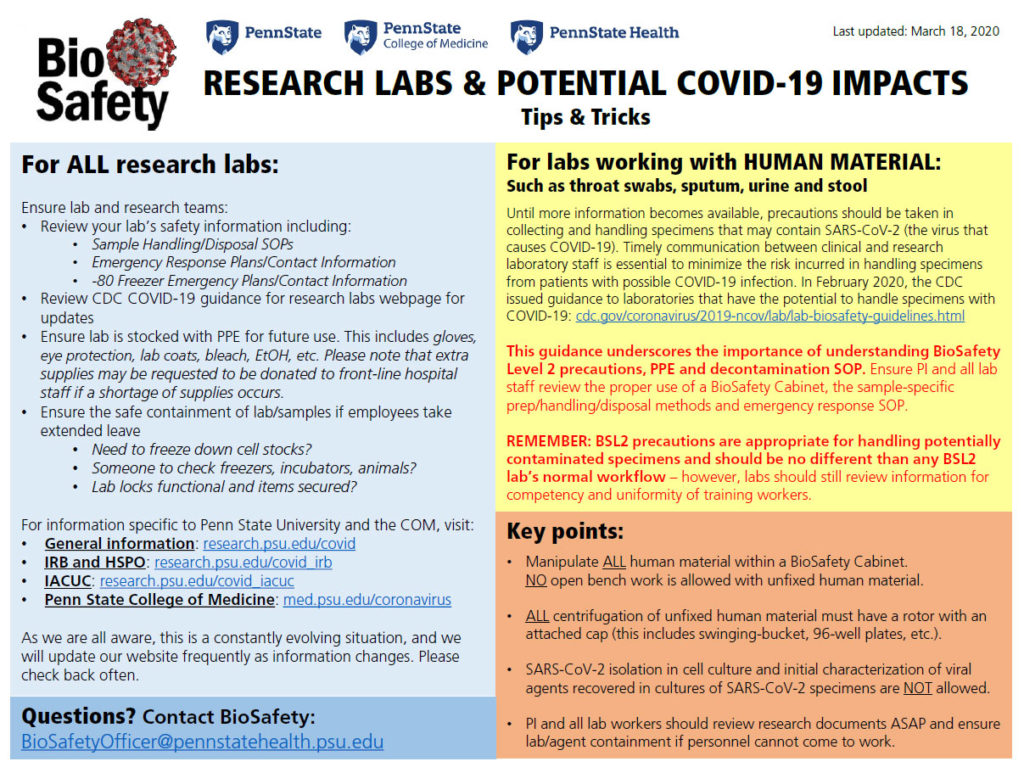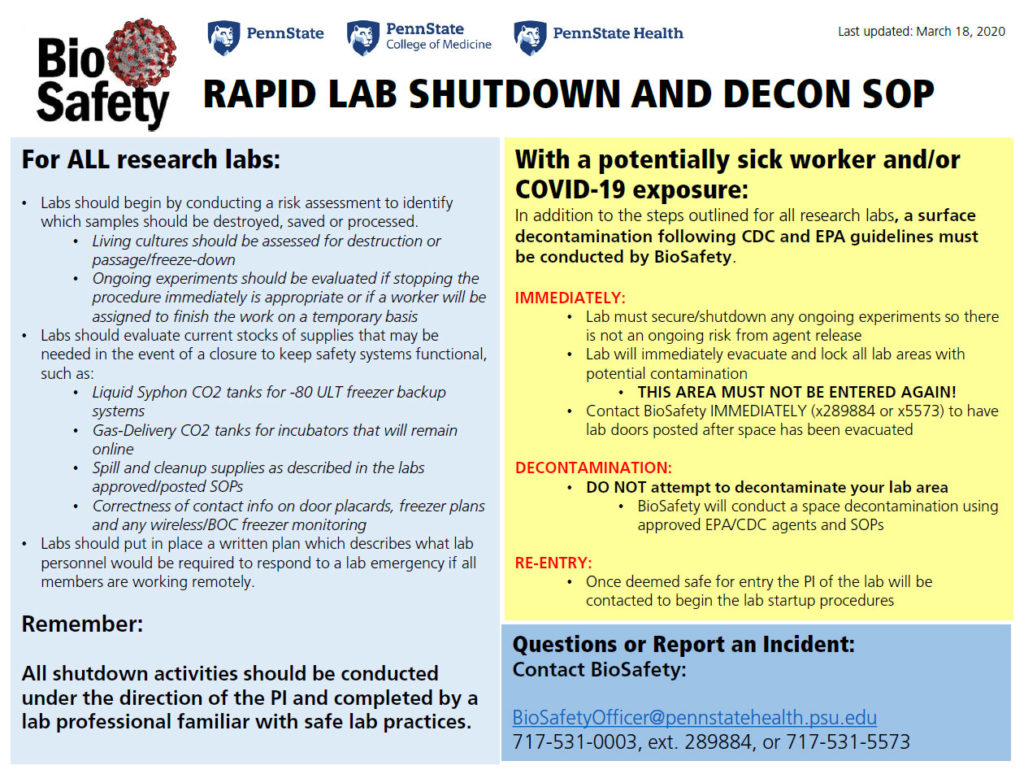Penn State College of Medicine is committed to preventing exposure to bloodborne pathogens through its policies, procedures and training.
The following resources are available as guidelines for maintaining biological safety.
Jump to topic
Search
Biosafety Contact Information
With questions about Penn State College of Medicine biosafety:
- Email BiosafetyOfficer@pennstatehealth.psu.edu
- Call Ray Scheetz, Biosafety Officer and Manager, Research Laboratory Safety, at 717-531-5573
- Call Justin Arthur, Assistant Biosafety Officer, at 717-531-0003, ext. 289844
Biosafety forms and standard operating procedures can be accessed on the Infonet (ePass login required).
Biosafety: Research Labs and Potential COVID-19 Impacts
All information from the flyer is available below for quick reference.
Ensure lab and research teams do the following
- Review their lab’s safety information, including:
- Sample handling/disposal SOPs
- Emergency response plans/contact information
- -80 freezer emergency plans/contact information
- Review CDC Information for Laboratories section for updates
- Ensure lab is stocked with PPE for future use. This includes gloves, eye protection, lab coats, bleach, EtOH, etc.
- Please note that extra supplies may be requested to be donated to front-line hospital staff if a shortage of supplies occurs.
- Ensure the safe containment of lab/samples if employees take extended leave
- Need to freeze down cell stocks?
- Someone to check freezers, incubators, animals?
- Lab locks functional and items secured?
For COVID-19 details
- General information: research.psu.edu/covid
- IRB and HSPO: research.psu.edu/covid_irb
- IACUC: research.psu.edu/covid_iacuc
- Penn State College of Medicine: med.psu.edu/coronavirus
This is a constantly evolving situation, and all of these websites will be updated frequently as information changes. Check back often.
Until more information becomes available, precautions should be taken in collecting and handling specimens that may contain SARS-CoV-2 (the virus that causes COVID-19). Timely communication between clinical and research laboratory staff is essential to minimize the risk incurred in handling specimens from patients with possible COVID-19 infection.
The CDC’s website includes guidance to laboratories that have the potential to handle specimens with COVID-19.
This guidance underscores the importance of understanding Biosafety Level 2 (BSL-2) precautions, PPE and decontamination SOP. Ensure PI and all lab staff review the proper use of a biosafety cabinet, the sample-specific prep/handling/disposal methods and emergency response SOP.
See requirements for working with COVID-19 human materials here
- Manipulate all human material within a biosafety cabinet. No open bench work is allowed with unfixed human material.
- All centrifugation of unfixed human material must have a rotor with an attached cap (this includes swinging-bucket, 96-well plates, etc.).
- SARS-CoV-2 isolation in cell culture and initial characterization of viral agents recovered in cultures of SARS-CoV-2 specimens are not allowed.
- PI and all lab workers should review research documents ASAP and ensure lab/agent containment if personnel cannot come to work.
Biosafety: Rapid Lab Shutdown and Decon SOP
All information from the flyer is available below for quick reference.
- Labs should begin by conducting a risk assessment to identify which samples should be destroyed, saved or processed.
- Living cultures should be assessed for destruction or passage/freeze-down.
- Ongoing experiments should be evaluated if stopping the procedure immediately is appropriate or if a worker will be assigned to finish the work on a temporary basis.
- Labs should evaluate current stocks of supplies that may be needed in the event of a closure to keep safety systems functional, such as:
- Liquid Syphon CO2 tanks for -80 ULT freezer backup systems
- Gas-Delivery CO2 tanks for incubators that will remain online
- Spill and cleanup supplies as described in the lab’s approved/posted SOPs
- Correctness of contact info on door placards, freezer plans and any wireless/BOC freezer monitoring
- Labs should put in place a written plan which describes what lab personnel would be required to respond to a lab emergency if all members are working remotely.
In addition to the steps outlined for all research labs, a surface decontamination following CDC and EPA guidelines must be conducted by Biosafety.
IMMEDIATELY:
- Lab must secure/shut down any ongoing experiments so there is not an ongoing risk from agent release.
- Lab will immediately evacuate and lock all lab areas with potential contamination.
- This area must not be entered again.
- Contact Biosafety immediately (call 717-531-0003, ext. 289884 or 717-531-5573) to have lab doors posted after space has been evacuated.
DECONTAMINATION:
- Do not attempt to decontaminate the lab area.
- Biosafety will conduct a space decontamination using approved EPA/CDC agents and SOPs.
RE-ENTRY:
- Once deemed safe for entry, the PI of the lab will be contacted to begin the lab startup procedures.
Institutional Biosafety Policies and Procedures
Prior to work beginning, all clinical research trials, including any possible COVID-19 trials, are to submit the following:
- Biosafety and Recombinant DNA Assurances Form, or amendment to current approval
- Associated SOP for working with materials based on the template
- The BioSafety and Recombinant DNA Assurances Form and Clinical Biosafety Research Specimen SOP Template can be accessed via OneDrive (Penn State Access ID login required).
Submissions will be reviewed by the Chair of the Institutional Biosafety Committee and the biosafety officers for process determination. If this is a new or complex procedure, please contact the biosafety officers or the Biosafety Committee chair to discuss the proposal.
Completed forms should be submitted to BiosafetyChair@pennstatehealth.psu.edu, BiosafetyOfficer@pennstatehealth.psu.edu and BiosafetyAdmin@pennstatehealth.psu.edu.
Purpose: To protect employees of Penn State Health Milton S. Hershey Medical Center and Penn State College of Medicine from occupational exposure to human blood and potentially infectious materials that may transmit bloodborne pathogens.
Bloodborne Pathogens Safety Program policy
(View in Policy Portal; requires Penn State Health ePass login)
Purpose: To ensure the safe acquisition, use, storage and disposal of biohazardous material used in research and instruction.
All research and instruction utilizing biohazardous or potentially biohazardous materials must be conducted in accordance with NIH/CDC guidelines as defined in “Biosafety in Microbiological and Biomedical Laboratories” (BMBL, latest edition). Any exemptions from these guidelines must be approved by the Institutional Biosafety and Recombinant DNA Committee. Additional regulatory requirements related to specific areas of biohazardous material acquisition, use, storage and disposal are defined in this policy.
Institutional Biosafety Manual
(Download from Policy Portal; requires Penn State Health ePass login)
Purpose: Describe procedure to follow after potential exposure to a Biosafety Level 2 (BSL2) or BSL2+ biohazard.
This policy applies to all personnel involved in research with BSL2 or BSL2+ biohazards at Penn State Health Milton S. Hershey Medical Center, Penn State College of Medicine and the Penn State Health Medical Group Academic Practice Division.
Procedure to Follow After Potential Exposure to a BSL2 or BSL2+ Biohazard
(Download from Policy Portal; requires Penn State Health ePass login)


